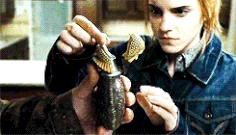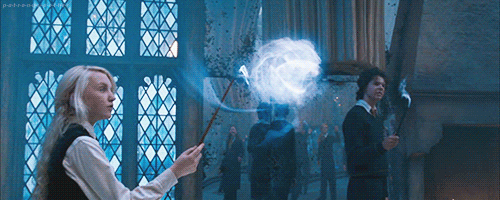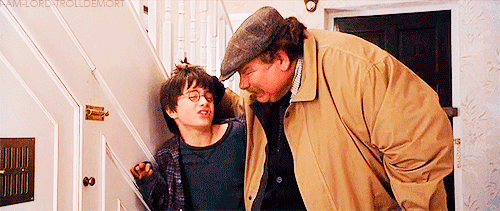The Power of Love: On the Spirit of “Harry Potter”
CONTENT WARNING: This article features brief depictions and discussions of abusive behavior and may be triggering to readers who are abuse or assault survivors. If you or someone you know is in crisis or dealing with abuse, you are not alone, and we urge you to seek help by using the hotlines mentioned at the bottom of this article.
I remember the day I chose to drive away from my abuser.
We had a pretty regular routine. I helped him with stats homework and cooked him fried rice. We played board games after dinner. When it became clear I was going to beat him at chess, he knocked over the kitchen table. Then I would cry, he would tell me to stop being selfish, and I would sit in silence until he demanded that I go to our room and think about what I had done.
Somewhere in the eye of that hurricane, I broke the hold of the Imperius Curse he had on me. I began to make choices for myself, and I grew fond of the feeling. In autumn, I decided to back out of a project we agreed to collaborate on. But this was about more than a group project. I was tired of the way he was treating me.
The day I told him I was quitting, I told him that I didn’t want to see him anymore, even as friends. He fought hard to keep me. He pulled out all the low blows, smashed furniture, threatened to beat me, but I still chose to walk out the door. I remember looking out the window of my car and watching him emerge from the front door, tears streaming down his face, standing in front of my car with arms crossed.
I turned the wheel and drove around him.
In our relationship, he sustained his life on my terror, the unicorn blood to his Quirreldemort; my life seemed the half-life, laid motionless in a spiritual body bind. But after I left, my spirit was awoken, and my soul was free.
With the curse broken, I was free to keep making my own choices. Each new choice uncovered a part of my identity that had been lost, but the going was slow. Paralyzed by trauma, it took me more than six years to recognize that I had a choice in every situation I was faced with. I could choose to walk away from a bad friendship. I could choose to stand up against my family’s prejudices. I could choose to face my fears and leave the apartment in the worst days of my agoraphobia, but in all these situations, the fierce bindings of trauma convinced me to sit still.
Trauma is its own kind of Imperius Curse. Your brain changes its shape and chemistry to deal with the nightmares it couldn’t escape. Trauma survivors often live in a state of hypervigilance, always ready to defend themselves, reacting to their environment on instinct. Moody’s best advice becomes Moody’s worst curse: constant vigilance! Long after you’ve reached a safe place, if your brain can identify an element of the environment as related to your trauma, what may be harmless will be perceived as harmful. There’s no way to think your way out of a flashback. You can’t choose to slow your heartbeat or eliminate the stabbing pain in your stomach. Your instincts have taken over, and they think they’re fighting for your life.
There is one way to fight off the racing heartbeat, the clenched stomach muscles, and lower the adrenaline: breathing, specifically the exhale. The exhale stimulates your parasympathetic nervous system, which “triggers the release of acetylcholine to put a brake on arousal, slowing the heart down, relaxing muscles, and returning breathing to normal” (Van der Kolk 79).
Yoga, meditation, and other breath-centered practices are excellent tools for trauma survivors to deal with posttraumatic stress, but they weren’t enough to let me function in my daily life. These practices helped me manage my symptoms, but I had relied on spirituality to get me through tough times as a child and floating through life without a metaphysical anchor was painful. Without a higher power to whom I could give up my worries, I felt desperately alone.
This was part of the reason alchemy appealed to me so strongly. Alchemical texts suggest that everything around us contains a “universal spirit,” that we are all made up of the same primal material. With this philosophy, I could find a higher power in anything, including myself. It didn’t take me long to start seeing this power everywhere. I could see the ferocity of my emotions in the raging waves of the ocean. When I held a cool stone against my cheek, I could feel my sense of stability and security strengthening. My racing thoughts slowed down and found a pleasing rhythm at the sound of wind chimes. Every time I lit candles, I felt my motivation soar.
I started to see my own reflection in everything and everyone around me. Plants, stones, stars, and human bodies are like instruments that shape the breath of the “universal spirit” that runs through us all, giving us each a unique sound. In alchemy, this unique expression of the life force is considered the soul.
When I was younger, my idea of the soul was very ill-defined. I was always somewhat cold to the idea of Dementors because I didn’t understand how someone’s individual life force could be taken. I see now how my abusers and my mental illnesses acted like Dementors, dulling the unique edges of my soul and almost sucking it away for good when things got bad.
The soul is a very important concept in the context of the Harry Potter books. Between Horcruxes and Dementors, the soul is discussed at length throughout the series. The Harry Potter Lexicon describes the soul as “part of a human being’s spiritual identity which is eternal and leaves the body upon death to go to the afterlife.” Dumbledore tells Harry that “tampering with the soul is to break the ‘deepest laws of magic’” (DH 35).
For all its talk of souls, the Potter books are surprisingly silent on the spirit. I felt that it was important to define the word “spirit” in a column concerning the spiritual aspects of the Potter series; and being one of the three universal principles of alchemy, I thought I would find more on the subject when I began my research, but it doesn’t even have its own page on the Harry Potter Lexicon. The word is used to define one of the three classifications of magical creatures in the wizarding world, but that’s the only significance it holds.
In his examination of the Potter series through an alchemical lens, John Granger names Hermione a “living symbol” of mercury in the golden trio (Granger 55). Mercury is the spirit, the bridge between the physical and the ethereal, the life force that moves between the body and the soul to make them both come to life.
This alchemical interpretation of the spirit is like views on the spirit from Abrahamic religions. In Islam, the Holy Spirit can refer to the angel Gabriel, a messenger between the physical world and the divine world, who could be compared with Mercury. In some branches of Christianity, the Holy Spirit is defined as the active force of God, the animating life force in all creatures, the fingers of God used to move and manipulate His world, and interestingly, breath or the breath of God.
This is interesting because of breath’s place in parts of Hindu philosophy. Prana is the Sanskrit word for “life force” or “vital principle” and is often used as a word for “breath” in modern yoga classes. The concept of prana is far more complex than this dual meaning alone, as are the concepts of “spirit” as mentioned in Islam and Christianity above, but this brings us back full circle to that important tool for trauma survivors to reclaim control over their bodies.
One might say the spirit and the breath are one and the same. Spirit is an active breath, an awareness and management of the inhale and exhale. A healthy spirit helps us break free from those who would do us harm. A vital spirit helps us cut through those threads of trauma and learn how to visualize a future where we thought there would never be one. A spiritual act is an act that brings the unseen into material reality.
I believe the word spirit has no prominence in the Potter novels because magic is an act of the spirit. Casting spells, breaking curses, and brewing potions are all ways of moving magic, the “universal spirit” of the wizarding world, into physical reality. Wands, herbs, and crystal balls are tools to help perform these acts more efficiently.
But spiritual acts in the Potter books are not limited to the realm of spellcasting. Time and time again, we see Harry step out of the bonds of his trauma; he never succumbs to the abuse of the Dursleys, he fights to break free every summer. He is not manipulated by Crouch, Scrimgeour, or anyone in the Ministry of Magic; he stands by his principles with ferocity.
Harry’s greatest act of spirit was tangled up in that mysterious magic called love. His choice to fulfill the prophecy was an act of love, not one of obligation.
… he understood at last what Dumbledore had been trying to tell him. It was, he thought, the difference between being dragged into the arena to face a battle to the death and walking into the arena with your head held high. Some people, perhaps, would say that there was little to choose between the two ways, but Dumbledore knew – and so do I, thought Harry, with a rush of fierce pride, and so did my parents – that there was all the difference in the world” (HBP 512).
That seemingly small shift in motivation did make all the difference in the world. Harry’s choice to act out of love for the parents he never got to meet, for Sirius, for Cedric, and for all others who were harmed by Voldemort led him to sacrifice himself to protect the rest of the wizarding world and emerge victoriously.
Action taken out of love is the most powerful magic known to wizardkind. This has extremely important implications for the rest of us because love is not an unfamiliar magic. We so-called Muggles are just as capable of magic as the greatest wizards of the Potter world. We just have to figure out what tools we need to put our spirit into motion and cast our spells.
Maybe we go to church; maybe we read the Quran; maybe we meditate under the moon; maybe we read our favorite chapter of Harry Potter and the Prisoner of Azkaban. No matter which tool we choose, every day, we must learn that we are worthy of love, especially of our own love. Choosing to act on love is the most powerful magic we can perform. It’s what defeated Voldemort.
So from this day onward, let’s flex our spiritual muscles and choose to drive away from the things that are no longer serving us. Let’s tune out that piercing cry of constant vigilance and choose instead to breathe. Let’s become witches and wizards and choose to cast a spell that will help us love ourselves.
Works Cited
A., Van der Kolk Bessel. The Body Keeps the Score: Brain, Mind, and Body in the Healing of Trauma. Penguin Books, 2015.
Granger, John. How Harry Cast His Spell: The Meaning behind the Mania for J.K. Rowling’s Bestselling Books. Tyndale House Publishers, 2008.
“The Three Philosophical Principles.” Organic Unity, www.organic-unity.com/top-menu/the-three-philosophical-principles/.
These are some resources for victims of assault if you intend to seek help…
National Domestic Violence Hotline
RAINN (National Sexual Assault Hotline)
National Suicide Prevention Lifeline









